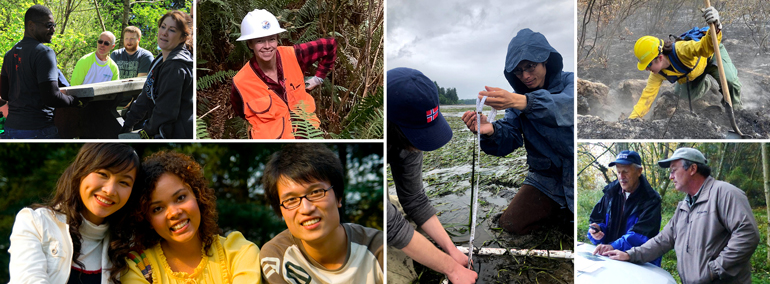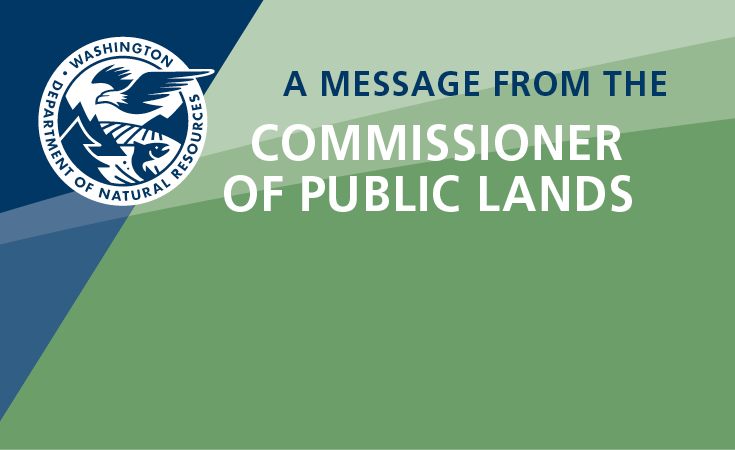Environmental Justice
All Washington residents, regardless of income, race, ethnicity, color, or national origin, have a right to live, work, and recreate in a clean and healthy environment. Low-income communities, communities of color, and Indigenous people in Washington and across the country often bear the brunt of pollution and the impacts of climate change. Our mission to sustain and protect Washington’s natural resources cannot be achieved without putting equity and environmental justice at the forefront.

What is environmental justice?
Environmental justice is the fair treatment and meaningful involvement of all people, regardless of race, color, national origin, or income, with respect to the development, implementation, and enforcement of environmental laws, regulations, and policies. This goal will be achieved when everyone enjoys the same degree of protection from environmental and health hazards and has equal access to the decision-making process to have a healthy environment in which to live, learn, and work.
What is HEAL?
In 2021, the legislature adopted the Healthy Environment for All (HEAL) Act (RCW 70A.02). This historic law provides a multiyear roadmap for the Department of Natural Resources (DNR) and other state agencies to integrate environmental justice (EJ) into strategic plans and decision-making processes. Starting in the fall of 2021, DNR and six other state agencies (Departments of Agriculture, Commerce, Ecology, Health, Transportation, and the Puget Sound Partnership) began meeting with Environmental Justice Council staff to collaborate on the development, authorship, and adoption of this interagency Community Engagement Guide for the first HEAL Act milestone on July 1, 2022.
What the Department of Natural Resource is doing to Implement HEAL
- In 2022, DNR's efforts began with the establishment of the Environmental Justice Council (EJC), on which we participate. The Council develops processes that are accountable to the public and adhere to environmental justice (EJ) practices and principles. Following its formation, the EJC accepted DNR’s provisional community engagement plan.
- In 2023 the DNR shared our Strategic and EJ Implementation Plan with the EJ Council
- In September 2023, DNR launched the Environmental Justice Assessment process, to be applied to all Significant Agency Actions. The Office of Environmental Justice began receiving proposed actions for assessment and plans to officially start applying the process in January 2024.
- From July 2022 to the present, DNR’s internal steering committee and EJ staff have refined the initial plan, customizing it to our unique needs and community preferences. We have scheduled a soft launch for an expanded public engagement process in mid-November. Between then and December, we aim to conduct outreach sessions, training modules, and assist in the voluntary adoption of these processes for public engagement.
Additional information and resources on DNR and the HEAL Act will be updated on this page (dnr.wa.gov/environmentaljustice)
DNR has released and updated the following plans for the agency:
-
DNR’s Tribal Government Consultation Policy (2023)
Each of these are awaiting Environmental Justice Council review and are in various stages of consultation with Tribal Nations. We look forward to updating this page soon with more resources and information about DNR’s efforts to embed Environmental Justice practices into our agency’s work on behalf of Washingtonians.
DNR’s Draft Pro-Equity Anti-Racism (PEAR) Plan
The Department of Natural Resources draft Pro-Equity Anti-Racism (PEAR) Plan reinforces a unified vision of pro-equity anti-racism (PEAR) for DNR, supporting DNR’s mission, values, and goals for developing, implementing, and embedding PEAR into every action across the agency. DNR’s PEAR Plan will incorporate diversity, equity, inclusion, and belonging (DEIB) as well as environmental justice (EJ) initiatives under a single equity framework. The PEAR Plan reflects how we do our daily work and who we are at our core – public servants with a shared desire for promoting equity, justice, access, and belonging for the people we serve and the staff who serve them. Take time to review the plan linked below. For questions on DNR’s Draft PEAR Plan, you can also reach us via email at: wcdsupport@dnr.wa.gov.


